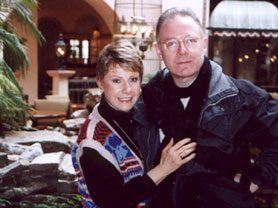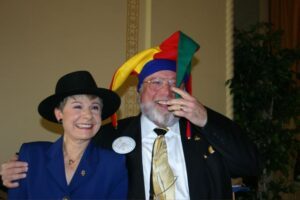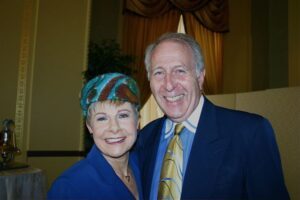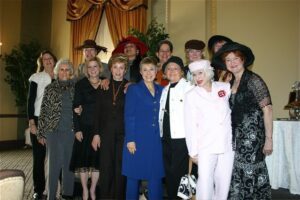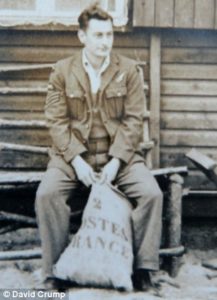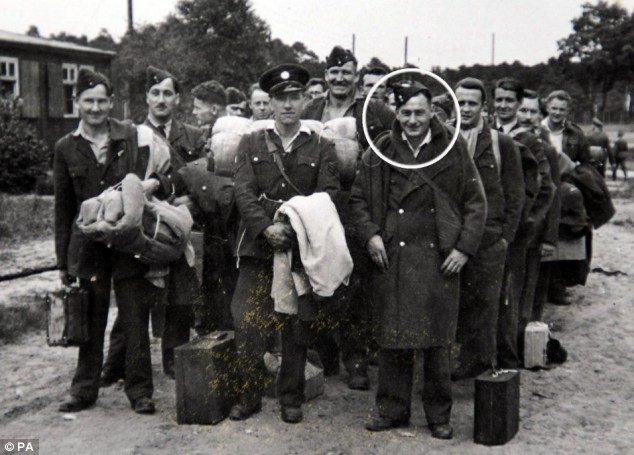Jacqueline Male, Commercial Director, Top Sales Associates wrote Patricia Fripp’s “What Hollywood Taught Me” details now appear on Top 10 Sales Articles including links back to both your site, and the publishing site.
You will also notice that we have a public poll, which allows our readers to select their favorit nomination – votes account for 50% of the overall score, the other 50% is provided by our panel of sales experts.”
WHAT HOLLYWOOD TAUGHT ME: 7 WAYS TO BECOME A STAR
Speaking techniques we can learn from Hollywood!
By Patricia Fripp, CSP, CPAE
The sultry blonde looked deep into the executive’s eyes, her voice throbbing with emotion. “I know you don’t know me,” she said, “but you must trust me. We don’t have much time. You need to do everything that I tell you. You’re not very experienced, but I’ve been doing this a long time. I am your new best friend.”
The couple spent the next four hours in a locked room. Their activities included role-playing and changing positions. “That was so good!” she’d cry. “Do it again! Even better. Try it standing up.”
Finally the door opened, and the executive emerged, exhausted but smiling. “I’ve been Fripped,” he told his friends, “and I can’t wait to do it again!”
This is how I open my speech called “How to Add Hollywood to Your Presentation.” The premise is: if you want to be a better speaker, go to the movies!
Why? Imagine that you have unlimited resources to design a keynote that will make you the hottest commodity on the market? Where would you go to get the best, highest-priced writers and directors in the world?
Hollywood!
In Hollywood, you’ll find hundreds of talented people, both in front of and behind the camera, all working together to create one money-making movie. The bad news is that you probably don’t have unlimited resources to hire all those people. The good news is you can still use seven basic Hollywood techniques to increase the impact of your presentation.
1. START WITH A FLAVOR SCENE
In David Freeman’s Screenwriting Seminar, he specifies sixteen ways to make the first three pages of a script “kick ass.” If they don’t, producers don’t read the rest of the script. If they don’t read it, they don’t buy it and they don’t make your movie.
Good movies often open with a “flavor scene,” grabbing attention and positioning the audience for what is to come. Relate the first three pages of a movie script to the first thirty seconds of your speech. Your flavor scene doesn’t necessarily have to lead where the audience expects it to, but it should make an impact and it must tie in to what follows. (Where do you think my sultry blonde story is going?)
2. USE SCENE CHANGES
Early in each movie, the hero or heroine commits to some course of action. Rocky Balboa agrees to fight Apollo Creed. Elle Woods of Legally Blonde resolves to go to Harvard. The sooner this happens, the sooner the audience gets emotionally involved.
Next, the lead character licks one challenge and runs smack into another. This involves scene changes. The movie literally moves from point to point, maintaining interest by changing settings, focal points, emotions, and energy levels.
The biggest enemy of a speaker, no matter how good, is “sameness” or lack of variety. Each time you move from story to story or example to example, this is a scene change. Use variety to keep your audience interested. Sadly, I’ve watched attractive, dynamic, articulate speakers go down in flames because the same energy level was used throughout. Their “scenes” never change.
3. TELL HOLLYWOOD STORIES
What makes a good Hollywood movie? Exactly the same thing that makes a good keynote speech–a great story! Screenwriter Robert McKee says, “Stories are the creative conversion of life itself into a more powerful, clearer, more meaningful experience.” We all love stories because, unlike real life, they have a purpose, a beginning-middle-end, and a punch line.
Start by identifying your main theme or purpose–your plot–and any subplots. For example, a Gap executive I’ll call “John” had just an hour and 20 minutes to work with me on an important speech. He was recently promoted and now was speaking for eight minutes to 500 young store managers. His topic was a program to get employees to contribute money-saving ideas. His subtext was “I deserved to get this promotion.”
In 8 minutes, he had to excite support for the money-saving program. If he did it well and inspired every Gap manager to go back to inspire all their employees, the impact could be incredible.
(Seventy-five minutes left of our coaching session.) “You’re going to do exactly what I tell you,” I said. “First, never say ‘good morning.’ It’s boring, it’s obvious, and the previous speakers have already said it. Walk on stage, look at the audience, and say, ‘We are here to talk about heroes.’ In seven words, you’ve just proved that this is not another dull, corporate speech.
“‘We are here to talk about heroes,’ you say, ‘Gap heroes. They may be sitting behind you. They may be sitting in front of you. They may be you.'”
I asked John to tell me a story about someone who had saved the company money. Do you know what he showed me? Statistics! “Statistics aren’t sexy,” I told him. “Numbers are numbing. Where’s the made-for-television movie?” He had no idea. So we phoned the Accounting Department and got a story. (Sixty minutes to go.)
One young man in the shipping department had noticed that seven Gap newsletters to the same location were going out in separate packets. This mail room hero thought, “Why don’t I pack them together with a note asking that they be distributed on the other end?” This worked well, so he urged his colleagues to question similar duplications. “Look, guys,” he told them, “we own stock in the Gap, not Fed-Ex!” His idea saved the Gap $200,000 that year.
Whenever you tell a story, be ready to answer the audience’s next question. In John’s case, his audience would be wondering, ‘What did the Gap do with that $200,000?'” So we researched some answers: “$200,000 is 18 miles of shelving. It’s carrying an additional jean size. It’s a month of ‘The Gap rocks’ commercials.” (Forty minutes to go in our session.)
To close, John would challenge his audience: “As Gap employees, you have good ideas all the time. Do you write them up and get them in the process so they can be evaluated? Or do you say, ‘What’s in it for me?'” This is where John would talk about cash rewards. (Thirty minutes to go.) John rehearsed his eight-minute speech, polishing, tightening, and adding more energy with each run-through, until he could do it without notes. (Time’s up!)
We ended by playing David Bowie’s Heroes which tied the opening into the close in a perfect circle.
4. CREATE CAPTIVATING CHARACTERS
Comedy impresario John Cantu knows that speakers mustn’t be the heroes of all their stories. Together, we analyzed one of his speeches and found sixty-two different characters! Learn from Hollywood. Fill your stage with other exciting performers, real and imaginary.
What does Hollywood do to make characters even more alive? In Analyze This, Robert De Niro is a bad guy who kills people. Yet, in the end, he gets only a few months in prison. Why? Because he is likable. How can you like a killer? Because Hollywood builds in the “likability factor.” The audience ends up pulling for him, despite his flaws.
If Hollywood techniques can make audiences like a vicious killer, surely the same techniques can get them on your side too. Build this likability into your characters. Start by identifying the values, needs, and wants of your audience. Then tell them about characters who also share them.
My audience at the Governor’s Conference for the State of Maryland was made up of government employees. Like their counterparts in corporate America, many were feeling under-appreciated. “The best thing about performance excellence on the job,” I said, “is that you take it home, and it affects your family life.
“One of my friends is an everyday hero like yourself.” And I told them about Bobby Lewis, a proud father who took his two boys to play miniature golf. ‘How much?’ he asked the ticket taker.
‘$3 for adults and for any kid older than six. Free for kids younger than six.”
“Well, Mikey is three and Jimmy is seven, so here’s $6.”
“Hey, mister,” the attendant sneered. “You like throwing your money away? You could have told me the big one was only six. I wouldn’t have known the difference.”
“Yes,” Bobby replied, “but my children would have known the difference.”
And the 2000 people in that audience broke into spontaneous applause. Why? Because that simple story, told with dialogue and a dramatic lesson learned, represented their values: that it’s not what you say you believe that counts. It’s what you model, encourage, reward, and let happen. Did I know they were going to applaud? No. Did I wait and let them enjoy it? Yes.
Here’s a homework assignment: Count how many characters appear in your speeches. They are what makes a Hollywood production–flesh and blood personalities that the audience can relate to.
5. CONSTRUCT VIVID DIALOGUE
Notice the conversation I described above between my friend Bobby Lewis and the ticket seller. Your stories come alive when you can use actual dialogue between your characters.
6. PROVIDE A LESSON LEARNED
Legendary Hollywood producer Sam Goldwyn said, “If I want to send a message, I’ll use a telegram.” Yet, all great films–and speeches–have a message. Some recent movies go on and on with explosions and car chases. They’re exciting, but at the end, the audience is left with a big “so what?”
However, when action and thrills serve a compelling story and finish up with a heart-tugging or eye-opening conclusion, we’re talking unforgettable Oscar winners. Ingrid Bergman leaves Bogart and gets on the plane with Paul Henreid in Casablanca because honor comes before love in wartime. Dietrich abandons her rich lover Adolphe Menjou in Morocco and follows Gary Cooper barefoot into the desert because love comes before money. And Harrison Ford, Jimmy Stewart, Jim Carey, Julia Roberts, and Tom Hanks struggle against huge odds because it’s better to lose than never to try.
The funniest or most exhilarating story will be pointless if you don’t tie it into your theme and provide a lesson learned.
7. EXPLORE COLLABORATING
Collaboration is mandatory in Hollywood, and it can work for speakers too. I often brainstorm with copywriting genius David Garfinkel and John Cantu, the San Francisco comedy legend. At one session, John was just out of the hospital after serious cancer surgery. We asked him to describe his experiences. In a few minutes, we were laughing so hard that I ran and got a tape recorder. “Start over,” I said.
As he talked, David Garfinkel kept adding dramatic effects, and I pointed out key lines of dialogue. When John finished, we had the foundation for a speech called, “Laughing All the Way to the Hospital.” It was full of human interest, funny and poignant.
Our collaboration was so exciting that we transcribed the tape and turned the experience into a National Speakers Association seminar. We built a set on stage, replicating my living room with hotel furniture. Then we re-enacted the whole thing, freezing the action every now and then so moderator Janelle Barlow could point out what we were doing. It was an incredible learning experience.
BACK TO THE SULTRY BLONDE
As you may have guessed, the sultry blonde at the beginning of this article was me. The executive was a former engineer who wanted to give an inspiring kick-off speech. His staff gave me the assignment to make him look “presidential.”
“Everyone sees you as ethical,” I said. “Tell me about your parents and where this honesty came from.” Then I asked him about his early achievements.
“When I was seven,” he told me, “I was on a water polo team. I was a good team player, but they decided I had leadership potential and put me on the fast track for the Olympics.”
“Tell your audience about this,” I said, “because it shows you have been training to be their leader since you were seven.” He recounted other exciting experiences: competing (and losing) in Mexico City, then training with other U.S. athletes in Russia where he attended a sports banquet. “They kept making toasts with vodka, and my roommate didn’t know you should just pretended to drink it. He ended up drunk, running up and down the hotel hallway in polka dot shorts and cowboy boots, pretending to be a bull.”
He told me about his other life achievements. “And why did you join this company?” I asked. The former engineer told me about all the opportunities he envisioned. “I want you to walk to the ‘power position’ in the center of the room,” I said, “and start by saying, ‘If I were you, I’d be wondering who this guy is and where he is taking the company. Before I tell you where we’re going, let me tell you where I came from.’
“Then you do two sentences about your parents. “Tell about when you were seven and about Mexico City. Tell the Russian story from the perspective of the Russian hotel maid. Imagine how you would have felt, seeing your first American, and he’s a nearly naked, buff, eighteen-year-old who thinks he’s a bull. Then talk about why you joined the company, the upgraded headquarters and new products. Tell them, ‘Now, it’s time to upgrade the workforce — you!’ Explain how this is going to happen and what they are going to do.
At the end of our four hours, the executive had gone through his speech twice, and we’d taped it. “Listen to the tape until you know it nearly by heart.” Ten days later he gave his speech with no notes. He was breathtaking.
So if this man, a former engineer who wasn’t an experienced speaker, could use Hollywood principles after one afternoon of being Fripped, imagine what you can do.
Identify the story you want to tell, populate it with flesh and blood characters, add stimulating dialogue, and provide a dramatic lesson learned. That’s Hollywood! See you at the movies.
VOTE https://fripp.com/wp-content//index.php/component/content/501?task=view&ed=113&Itemid=10479
Robert Fripp and sister Patricia Fripp taking a box after a Hollywood performance at the American Payroll Association 2008.
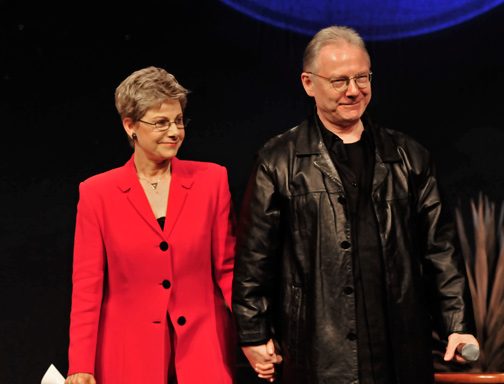
Read More...
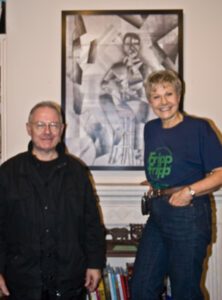

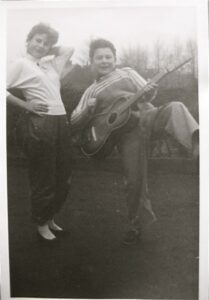
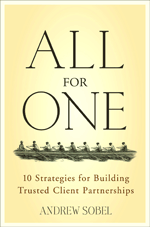 “Great relationships start with great conversations, not one person showing the other how smart he or she is.”
“Great relationships start with great conversations, not one person showing the other how smart he or she is.”